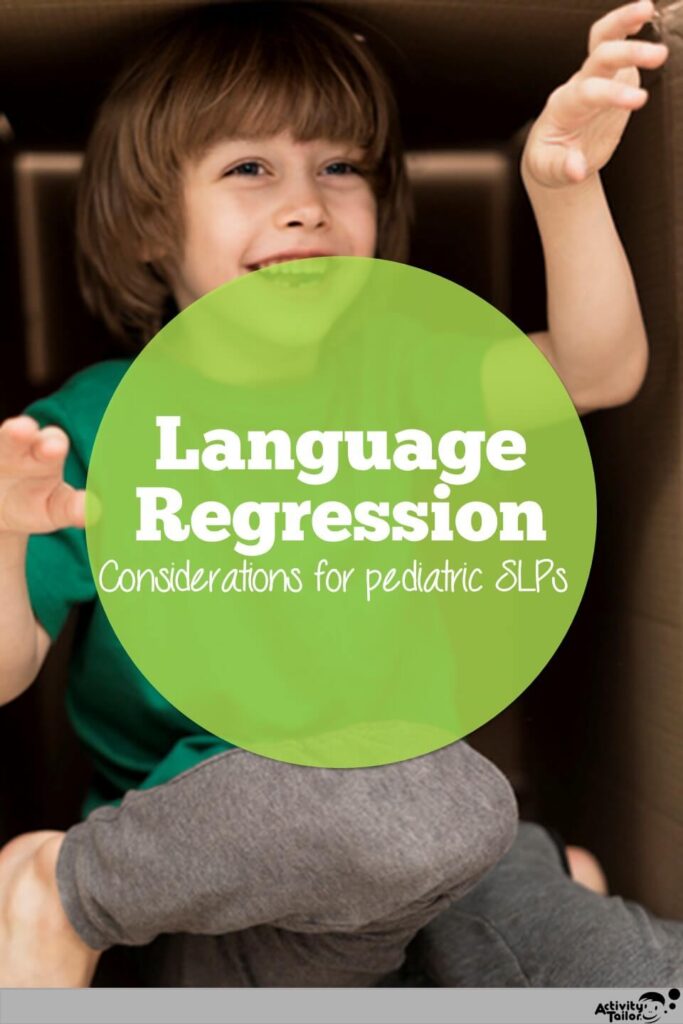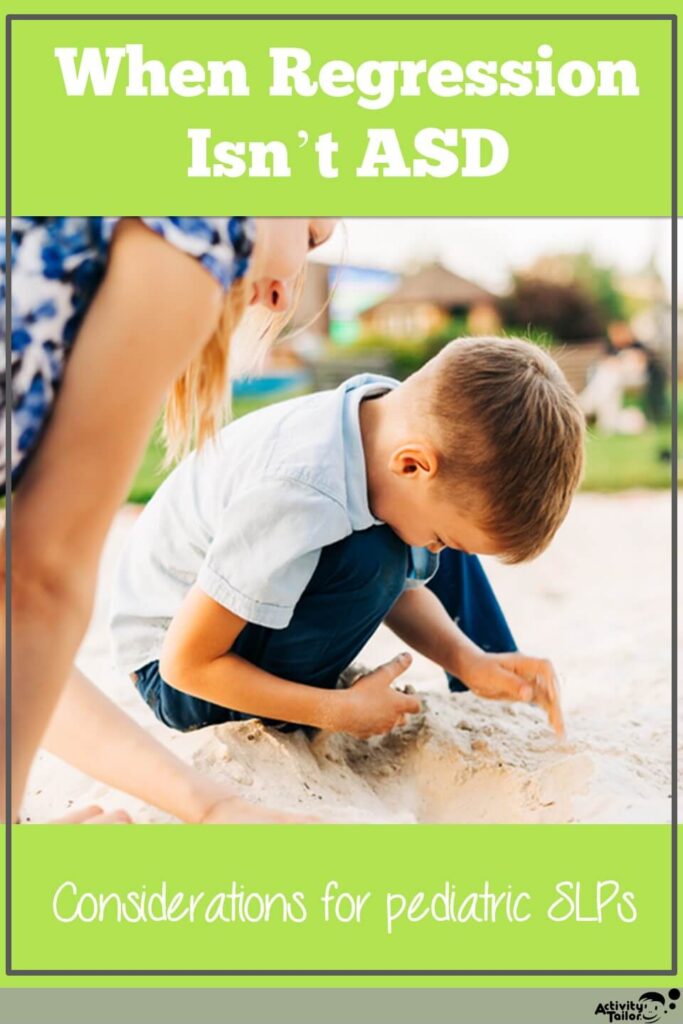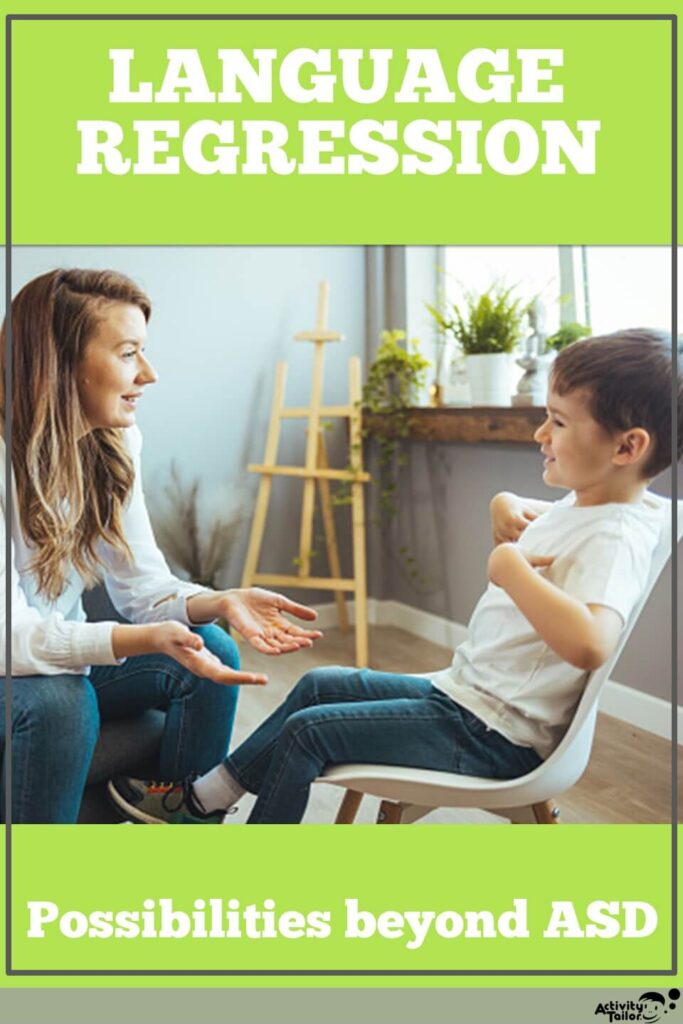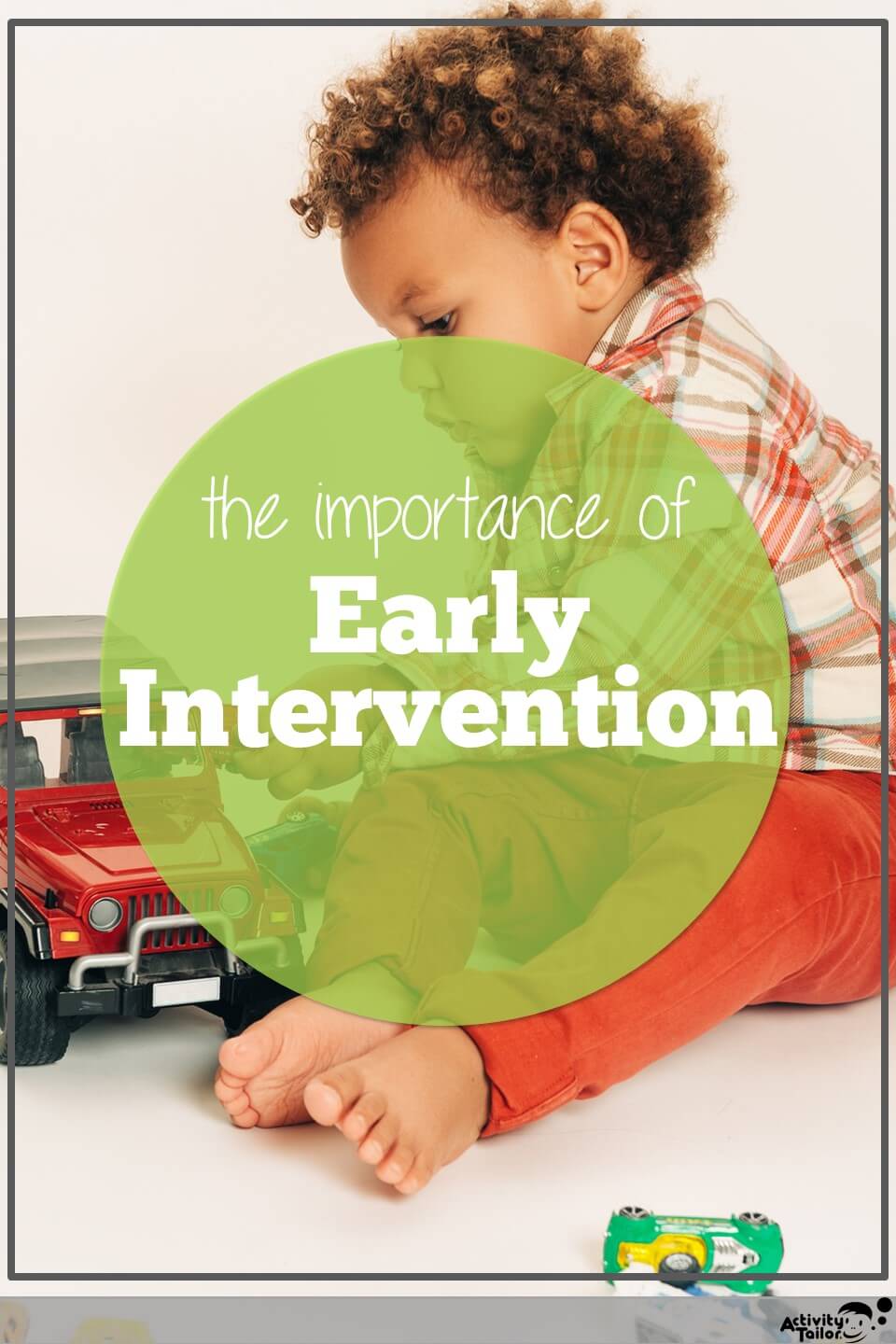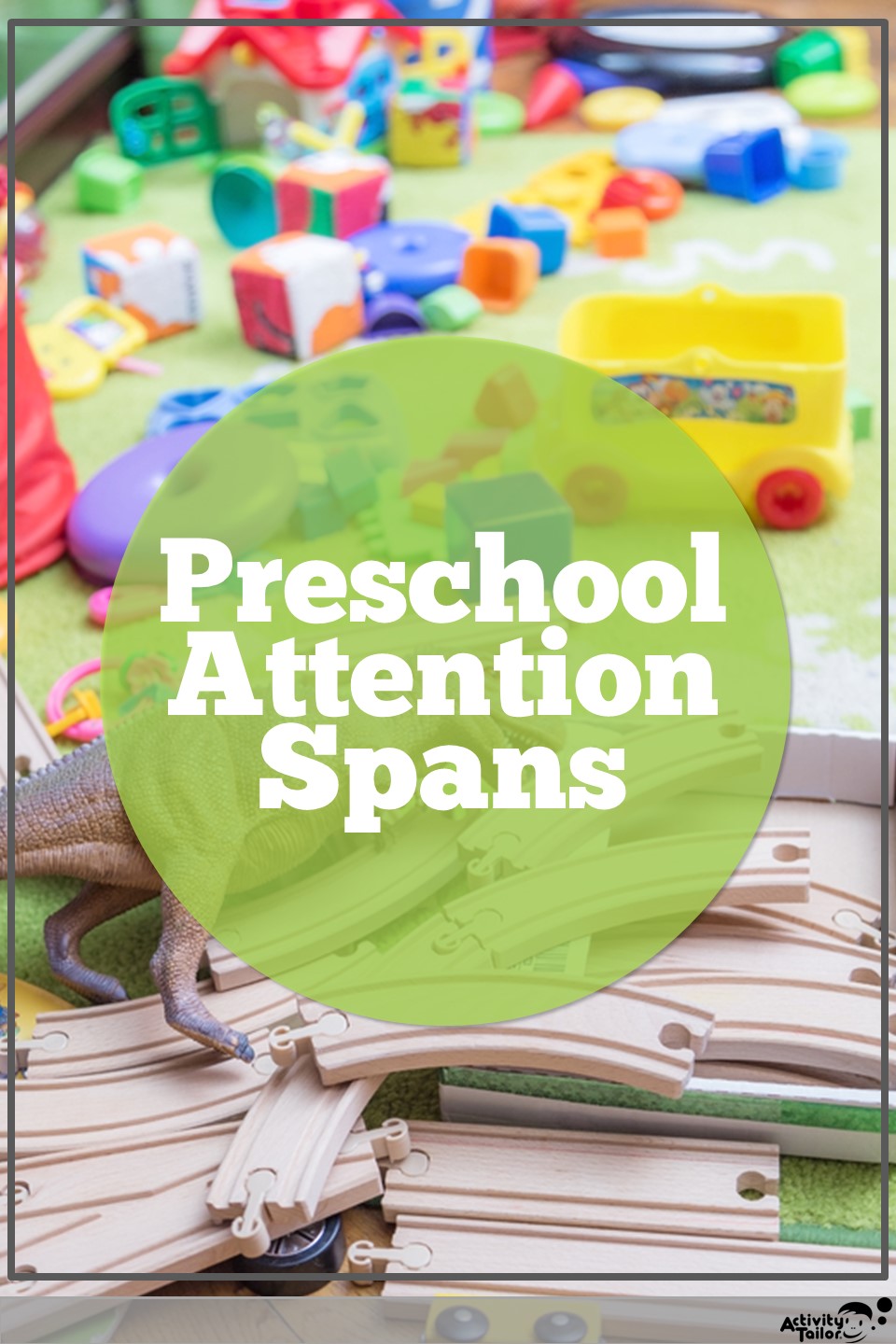While Autism Spectrum Disorder (or ASD) is commonly associated with language regressions in young clients, it’s critical for you as an SLP to consider other causes for these setbacks. To provide the best, most effective services to your clients and their caregivers, you’ll likely have to broaden your perspectives! Think about these 6 alternative causes for language regressions when ASD isn’t a piece of the puzzle for your client.
- Selective Mutism
- PANDA/PANS
- Traumatic Brain Injury
- Seizure disorders
- Hearing Loss
- Second Language Learners
Language Regressions
Before we dive into other considerations, let’s think solely about language regressions. A language regression is defined as any decline in a child’s communication abilities.
Commonly reported language regressions by parents include:
- Child no longer responds to his name
- Child no longer waves bye-bye
- Child no longer says “Mama” or “Dada”
Language regressions are different than language delays. A delay is identified when a child fails to meet language milestones. They are progressing more slowly than their peers.
Because a language regression CAN be a sign of autism, this is often where parents (and even some pediatricians) jump in their minds. As the SLP, you should help parents recognize the early signs of autism but also be knowledgeable of a variety of other diagnoses that can cause language regressions in young children.
6 Alternative Causes for Language Regressions Beyond Autism
Here are 6 common diagnoses, aside from ASD, that may be associated with your client’s language regressions.
*It is important to note that this list is not exhaustive!
1. Selective Mutism
One often overlooked condition is selective mutism.
This usually affects young children between the ages of 3 and 6 who are starting preschool or school. These children usually have typically developing language skills in their home setting or with one or two preferred speakers. In other, less familiar settings, these children may present with no or extremely few language skills.
These children may also demonstrate behaviors similar to ASD such as sensory meltdowns, minimal eye contact, and self-soothing behaviors.
The possibility of this diagnosis is a great reason to support obtaining a thorough home and school case history with each child you see– whether in the school system, daycare, or in a private clinic.
Referrals
As the SLP, you play an important role in screening, assessing, diagnosing, and treating persons with suspected selective mutism. This diagnosis requires a team effort though!
It’s important to encourage caregivers to discuss these concerns with their child’s pediatrician. A referral to a psychologist or psychiatrist who is familiar with working with young children with anxiety.
2. PANDAS/PANS
PANDAS/PANS is another consideration for language regressions beyond Autism. These diagnoses refer to Pediatric Autoimmune Neuropsychiatric Disorders Associated with Streptococcal Infections/Pediatric Acute-Onset Neuropsychiatric Syndromes. These disorders present in children through sudden and significant changes in speech, language, and even feeding skills or behavior.
PANDAS is caused by a strep infection that manifests as inflammation in a child’s brain. PANS is caused by bacterial infections, viruses, or environmental triggers.
Children dealing with PANDAS or PANS usually present with stuttering or cluttering, OCD symptoms, anxiety, self-stimming behaviors, and exaggerated and sudden changes in emotions. One in five children diagnosed with one of these disorders will also develop feeding challenges including limited food intake and food-related sensory issues. These concerns can often look similar to ASD characteristics.
While most SLPs don’t receive education in this area, we should! Recent data showed that PANDAS/PANS affects 1 in every 200 children with suspected prevalence rates being even higher.
Referrals
If PANDAS or PANS is suspected in a child, you should make a medical referral for a strep test. Antibiotics and anti-inflammatory medications are necessary to treat brain inflammation.
Early detection and treatment are vital in these cases!
3. Traumatic Brain Injury
Traumatic brain injuries (TBIs) aren’t often considered when a child is referred to you for a language regression, but it’s another alternative that you shouldn’t overlook.
Children’s brains are still developing (continuing through early adulthood!) and can result in symptoms of a TBI not presenting for hours, days, or even years after an incident! Children often look fine soon after a potentially traumatic event.
A traumatic event may not even be one that a caregiver remembers as significant due to the higher frequency of falls a child experiences in toddlerhood and preschool years. Reviewing common signs of a TBI with families can help them recall potentially traumatic events their child experienced.
Signs of a TBI:
- Fussiness
- Clinginess
- Vomiting
- Changes in eating or sleeping patterns
- Reduced speech or language abilities
Referrals
When a TBI is suspected, first reassure parents that many of these signs are normal for young children, so they shouldn’t blame themselves if they did not recognize trauma sooner.
Then, make a referral to a neurologist to evaluate the potential TBI. Diagnostic imaging like a CT or MRI may be needed to evaluate the extent of brain injuries.
4. Seizure Disorders
Seizure disorders like epilepsy can impact developing speech and language skills. When seizures are small, they are likely to go unnoticed at first. It may take a while for caregivers to notice a gradual change in speech or language skills or other developmental skills.
What can make this even more challenging is that seizure disorders co-occur in approximately 12% of children diagnosed with autism. This cooccurrence is more likely with girls as well.
*It’s important to note that epilepsy only occurs in approximately 1% of the general population.
Referrals
Refer caregivers to their child’s primary care provider if you have concerns about seizures in their child. A visit to a neurologist or epileptologist may also be needed.
5. Hearing Loss
Because newborn hearing screenings are now the norm, it is easy to assume that a toddler is unlikely to have an undiagnosed hearing loss. However, 1 in 4 infants who do not pass the newborn hearing screening do NOT receive the appropriate follow-up. (The rate is nearly twice that in Texas!)
Depending on the significance of the hearing loss or if the loss is progressive, children may present with a regression of language skills. If a child cannot consistently hear speech sounds, they may not be able to respond appropriately to their name being called, imitate speech sounds, or follow directions. These symptoms are similar to those associated with ASD.
On occasion, you may find that a child has experienced temporary hearing loss due to the buildup of ear wax or fluid behind the ear drum. When underlying causes such as food allergies or ear infections are addressed, the hearing loss goes away.
Referrals
It is always a good idea to refer clients with language regressions to an audiologist and ENT (ear, nose, throat specialist) for appropriate evaluations and treatment.
An ENT may refer a child to an allergist if hearing loss is due to potential food allergies and wax buildup. Other recommendations the ENT may make include tubes, hearing aids, or a cochlear implant.
6. Second Language Learners
Children who were initially raised with one language and then placed in a setting where another language is predominately spoken are referred to as “second language learners”.
During this transition time, these children may experience a “silent period” which resembles a language regression. While the silent phase is usually a normal part of bilingual language learning, it does make it difficult to distinguish between typical skills and regressed ones. However, the “silent period” usually lasts no more than a few weeks.
You may encounter second language learners coming from any variety of languages such as:
- American Sign Language
- Spanish
- French
- Cantonese
Referrals
When working with a second language learner, it is always best practice to include an interpreter in your sessions. Once you discover what language the child is most familiar with, you can search for local or virtual interpreters to assist in you!
Other Considerations
Some medications may result in language regressions. Consult with the child’s medical professionals when this may be the case.
Big changes in a child’s life may also result in these setbacks, although they will likely resume normal development after these changes have settled down or become familiar.
These changes might include:
- Moving into a new home
- A new baby being born into the family
- Learning a new skill like potty training
By considering alternative possibilities to language regressions beyond autism, you are ensuring that each client receives the most comprehensive and effective approach to speech therapy. Remember, you’re exactly who your clients need to make great progress!
You may also be interested in reading:
Understanding Pop-Out Words in Speech and What They Mean for My Child
Speech Regressions in Toddlers: Why They Happen and How to Help
Why is early intervention important?


